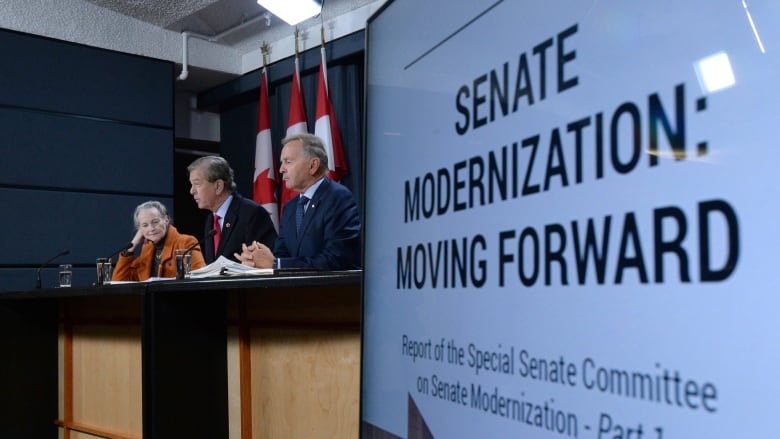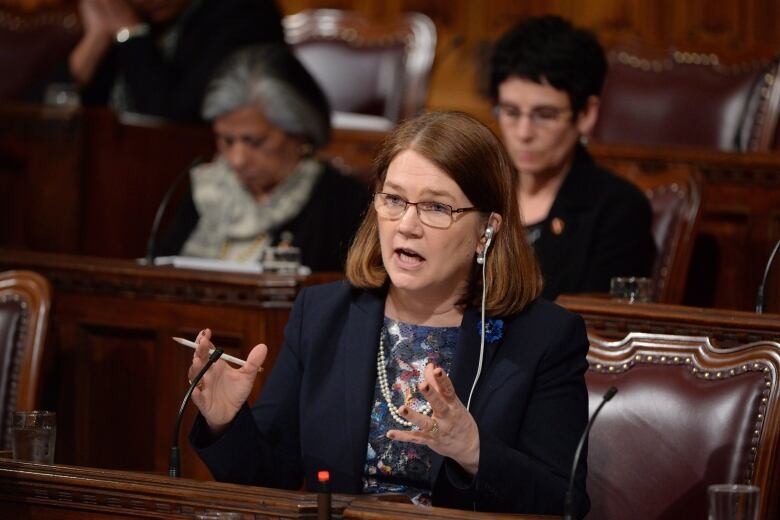Senate proceedings should be televised, committee says
Report says broadcasting proceedings would demonstrate 'high quality of debate' in Red Chamber

The committee charged with modernizing the Senate recommends thatall proceedings in the chamber be televised to showCanadians the "value" of the upper house.
"The committee's recommendation to allow the broadcasting of Senate proceedings would demonstrate the high quality of debate that is the hallmark of the Red Chamber," the report released Tuesday says."Senators are independent thinkers who argue from evidence, not from talking points their debates are a model for how parliamentarians should behave."
The committee recommends that when the Senate moves from its place in Centre Block across the street to the government conference centrein 2018to allow forextensive renovationsof the historic building the temporary chamber should be outfitted with broadcast equipment.
- Senate considering outside oversight of expense claims
- Senate 'should admit it made a mistake' on expense cases, ex-senator Hugh Segal says
- Would you like to be a senator? Well, now you can apply
"Allow me to be blunt," Senator ThomasMcInnis, the chair of the committee,told reporters Tuesday. "The Senate is misunderstood and is seen as an unnecessary parliamentary appendage."
But, he said, that characterization is unfair, as the Red Chamber is a "model parliamentary institution" where substantive debate on legislationstill rules the day.
"When we do not see eye to eye, we use substance and logic to persuade."

Omnibus legislation recommendation
McInnissaid debate could also be strengthened by one of the committee's proposals: divide up omnibus legislationpassed by the House to allow for a morethorough analysis. Omnibus bills were frequently used by the former Harper government, and critics said they were used to bury controversial legislative changes to avoid attracting attention.
"Bills jampacked with disparate clauses cannot easily be referred to specialized committees where experienced senators provide necessary scrutiny," he said. "Omnibus bills are opaque and undemocratic; they prevent the government from being held to account."
The committee also hopes tomake ministers' question period permanent.
Since last fall, cabinet ministers have taken the unusual step ofappearing in the chamber to answer questions from senators, in part because there is not a traditional government leader in the Senate to field questions from the opposition.
Senator Peter Harder, who serves as the government's "representative," is not equipped tospeak with authority on all files before Parliament, and has frequently asked for time to come back to the chamber with answers to specific inquiries.

The report suggestsreducing question period to just two days a week one for a visiting minister, and another for Harderto answer questions.
Allthe proposed changes will be debated in the Senate, and must pass the chamber to be enacted.
More robust role for Independents
The committeealso proposes expanding the definition of "caucus" to include groups of nine or more senators "formedfor a parliamentary purpose," which would give those senators access to Senate resources namelybigger research budgets and would make it easier for Independent senators to be represented on committees.
It is at committees that legislation from the House is studied and debated,andsenators can also exercise their "sober second thought" function.
Until now, it has been difficult for Independent senators to sit on committees of their choice because membership has been controlled by the two political parties.
The number of Independent senators will soon dwarf the number of those from the Conservative and Liberal caucuses, as Prime Minister JustinTrudeauhas vowed to fill all 21 remaining vacancies by the end of this year.
Independent Senator Elaine McCoy saidthere are still many "traditionalists" in the Senatewho are opposed to these major changes and themove away frompartisanship, but others are increasingly on board.
"I am seeing a shift towards a more open, collaborative approach, one that stresses review of legislation based on evidence, not speaking notes, and one that stresses our obligations to Canadians," she said.
The committee is also proposing changes to how the Senate Speaker is chosen.
Currently, the prime minister makes the pick,but thereport released Tuesday suggests senators themselves draw up ashortlist of 5 possible names from which the Speaker can be selected.
"Members of the committee believe senators are best placed to put forward the names of colleagues who are particularly diligent and respected," the report said.
(PDF KB)
(Text KB)CBC is not responsible for 3rd party content












_(720p).jpg)


 OFFICIAL HD MUSIC VIDEO.jpg)
.jpg)



























































































